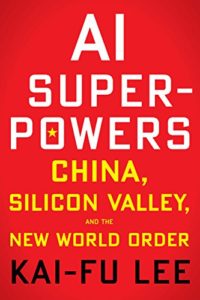 At a moment of great anxiety about the state of modern liberal democracy, artificial intelligence in China appears to be an incredibly powerful enabler of authoritarian rule. Is the arc of the digital revolution bending toward tyranny, and is there any way to stop it? Nicholas Thompson (@nxthompson), WIRED editor in chief, and the Eurasia Group’s Ian Bremmer (@ianbremmer) ask. More than any other country, Beijing’s communist regime has shown that autocracy is quite compatible with the internet age, they write for WIRED magazine.
At a moment of great anxiety about the state of modern liberal democracy, artificial intelligence in China appears to be an incredibly powerful enabler of authoritarian rule. Is the arc of the digital revolution bending toward tyranny, and is there any way to stop it? Nicholas Thompson (@nxthompson), WIRED editor in chief, and the Eurasia Group’s Ian Bremmer (@ianbremmer) ask. More than any other country, Beijing’s communist regime has shown that autocracy is quite compatible with the internet age, they write for WIRED magazine.
Democratic leaders have already acknowledged the dangers AI poses to democracy and are starting to enact national policies, but this alone might not be enough, analyst Leopold Schmertzing argues in Democracy in the Age of Artificial Intelligence, a report for the European Parliament. As French President Emmanuel Macron recently stated, if we do not deal with the immense potential of AI – both negative and positive – while it is still in its infancy, ‘AI could totally jeopardize democracy’.
 China has two fundamental advantages over the US in building a robust AI infrastructure, and they’re both, generally, advantages that authoritarian states have over democratic ones, Thompson and Bremmer add:
China has two fundamental advantages over the US in building a robust AI infrastructure, and they’re both, generally, advantages that authoritarian states have over democratic ones, Thompson and Bremmer add:
- The first is the sheer scope of the data generated by Chinese tech giants. Think of how much data Facebook collects from its users and how that data powers the company’s algorithms; now consider that Tencent’s popular WeChat app is basically like Facebook, Twitter, and your online bank account all rolled into one. China has roughly three times as many mobile phone users as the US, and those phone users spend nearly 50 times as much via mobile payments. China is, as The Economist first put it, the Saudi Arabia of data. …
- China has a second big advantage as we move into the era of AI, and that’s the relationship between its largest companies and the state. In China, the private-sector companies at the cutting edge of AI innovation feel obliged to keep Xi’s priorities in mind. Under Xi, Communist Party committees within companies have expanded. Last November, China tapped Baidu, Alibaba, Tencent, and iFlytek, a Chinese voice-recognition software company, as the inaugural members of its “AI National Team.” The message was clear: Go forth, invest, and the government will ensure that your breakthroughs have a market not just in China, but beyond.







